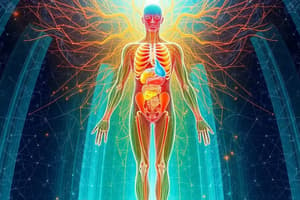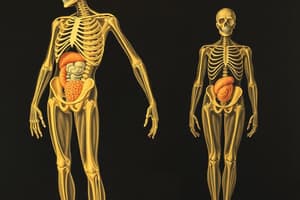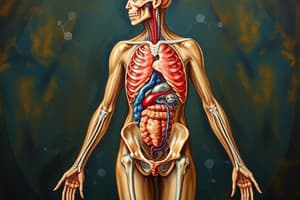Podcast
Questions and Answers
What role does the heart play in the circulatory system?
What role does the heart play in the circulatory system?
The heart acts as the central pump that circulates blood throughout the body.
How do the small and large intestines contribute to digestion?
How do the small and large intestines contribute to digestion?
The small intestine absorbs most of the nutrients from digested food, while the large intestine reabsorbs water.
What is the primary function of the endocrine system?
What is the primary function of the endocrine system?
The endocrine system produces and secretes hormones that regulate bodily functions.
How do kidneys function as part of the excretory system?
How do kidneys function as part of the excretory system?
What protective functions does the integumentary system provide?
What protective functions does the integumentary system provide?
What is the importance of the lymphatic/immune system in the body?
What is the importance of the lymphatic/immune system in the body?
What types of muscle tissues are involved in the muscular system?
What types of muscle tissues are involved in the muscular system?
How does the nervous system facilitate body functions?
How does the nervous system facilitate body functions?
Flashcards
Integumentary System
Integumentary System
The body's largest organ, which acts as a barrier against external threats, regulates temperature, and prevents dehydration.
Muscular System
Muscular System
This system controls the body's movements, with three types of muscles: skeletal, smooth, and cardiac.
Nervous System
Nervous System
This system manages communication and coordination within the body, consisting of the brain, spinal cord, and neurons.
Circulatory System
Circulatory System
Signup and view all the flashcards
Digestive System
Digestive System
Signup and view all the flashcards
Excretory System
Excretory System
Signup and view all the flashcards
Endocrine System
Endocrine System
Signup and view all the flashcards
Lymphatic/Immune System
Lymphatic/Immune System
Signup and view all the flashcards
Study Notes
Human Body Systems
- The human body is composed of millions of cells, each carrying the complete DNA code.
- Cells work together to form tissues, which in turn form organs, like the heart.
- Organs are grouped into organ systems, like the circulatory system, which are not isolated but work together.
- There are 11 Major Organ Systems:
Circulatory System
- Responsible for transporting blood, which carries oxygen, carbon dioxide, nutrients, and waste products.
- The heart is the central pump for blood circulation.
- Arteries carry blood away from the heart, veins carry blood back to the heart, and capillaries are tiny blood vessels connecting them.
- Blood is always red, but the shade of red can vary due to the amount of oxygen present.
Digestive System
- Involved in breaking down food and absorbing nutrients.
- Digestion begins in the mouth with salivary enzymes.
- Stomach acid further breaks down food.
- The small intestine absorbs most nutrients, while the large intestine reabsorbs water.
- Several accessory organs contribute to the system, like the liver and pancreas.
Endocrine System
- Produces and secretes hormones, responsible for regulating various bodily functions.
- Examples include growth hormone and adrenaline, influencing numerous biological processes.
Excretory System
- Excretes metabolic waste from the body.
- Includes the kidneys, which filter waste from the blood and produce urine.
- Other mechanisms like sweating also contribute to waste removal.
Integumentary System
- The largest organ in the body, encompassing the skin.
- Skin protects organs from external damage, regulates temperature, and prevents water loss.
Lymphatic/Immune System
- Consists of lymph, a fluid that circulates throughout the body, collecting and filtering waste.
- Plays a crucial role in immune function, protecting the body from pathogens like viruses and bacteria.
- Includes lymph nodes, thymus, spleen, tonsils, and bone marrow, all working together to fight infections.
Muscular System
- Responsible for movement, with three types of muscle tissue: skeletal, smooth, and cardiac.
- Enables bones to move and perform various functions, supporting vital body movement.
Nervous System
- Controls voluntary and involuntary actions in the body.
- Includes the brain and spinal cord, as well as peripheral nerves that act throughout the body.
- Utilizes specialized cells called neurons for communication and coordination.
Reproductive System
- Enables animals to reproduce, involving reproductive organs, which vary by sex.
Respiratory System
- Facilitates the intake of oxygen and the expulsion of carbon dioxide.
- The lungs are key organs in this system, with specialized structures for gas exchange.
Skeletal System
- Provides structure and support for the body.
- Adult humans have 206 bones, which protect organs and produce blood cells from bone marrow, crucial for overall body function.
- Organ systems work together to perform complex functions in the body.
- For example, during physical activity, the respiratory system increases breathing rate to deliver oxygen through the circulatory system to muscles, coordinating with the muscular and skeletal systems for efficient movement.
- The intricate interplay between these systems makes the human body a magnificent and complex masterpiece.
Studying That Suits You
Use AI to generate personalized quizzes and flashcards to suit your learning preferences.




